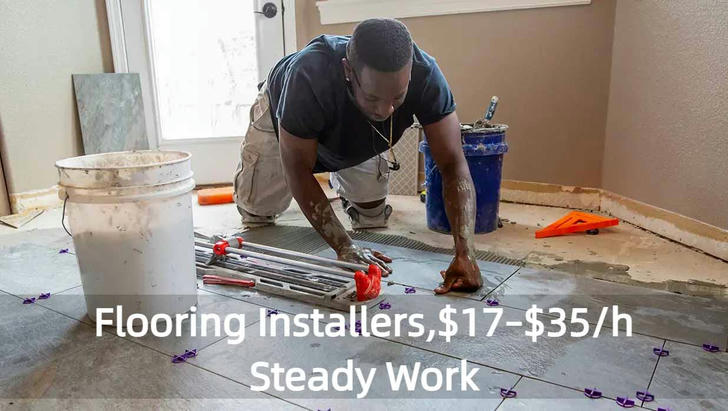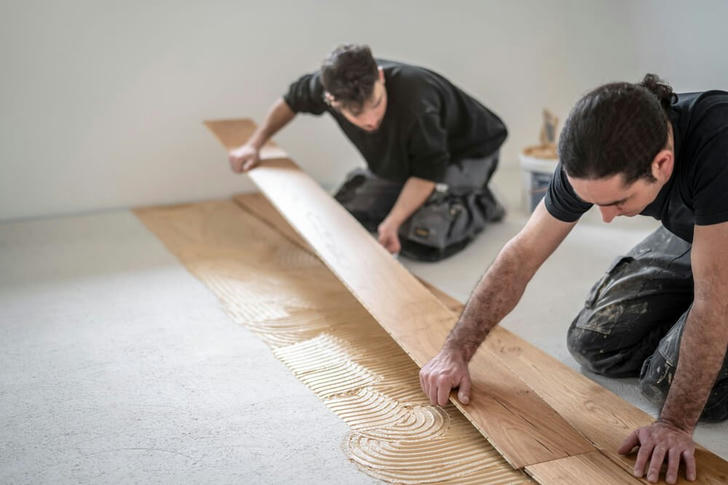Flooring Installers: Build Your Future with Hands-On Careers, Training, and Growth $17–$35 per hour
No experience? No problem!Seeking reliable, detail-oriented workers for professional flooring installation roles. Earn $17–$35/hour with flexible full-time or part-time options. Tasks include measuring, cutting, and installing residential/commercial flooring (hardwood, tiles, vinyl), operating tools, and ensuring quality finishes in fast-paced yet collaborative environments.

Flooring installers are the unsung heroes of construction, transforming raw spaces into polished, functional floors. This trade offers competitive pay, hands-on career growth, and job stability in industries like residential construction, commercial renovations, and hospitality. Here’s an in-depth look at what the role entails, including real-world insights and opportunities:
Pay & Benefits
Hourly Earnings: $17–$35/Hour(varies by material, location, and experience).
Example: Carpet installers earn $22–30/hour; hardwood specialists earn 28–45/hour.
Project Bonuses: Some employers pay extra for finishing ahead of schedule.
Benefits Package:
Health insurance, dental/vision plans (common for full-time roles).
Retirement contributions (401k) and paid time off.
Tool stipends or company-provided equipment.
Overtime pay (1.5x standard rate for after-hours work).
Training Opportunities:
Certifications: Subsidized courses in green flooring (e.g., LEED) or luxury vinyl installation boost earning potential.
Job Overview
Flooring installers install, repair, and maintain floors made of materials like hardwood, tiles, carpet, vinyl, and laminate. They work on-site in homes, offices, hotels, and warehouses, often collaborating with contractors and engineers. Unlike office roles, this job requires physical stamina, precision, and adaptability to varied work environments.
Key Responsibilities
Surface Preparation: Inspect subfloors for levelness, repair cracks, and clean surfaces.
Material Installation: Cut, measure, and lay flooring using tools like saws, trowels, nail guns, and adhesives.
Quality Assurance: Ensure seamless transitions between flooring sections and adherence to safety standards.
Client Collaboration: Address client preferences (e.g., color, texture) and resolve installation issues.
Specialized Skills:
Knowledge of flooring types and substrates (e.g., concrete, plywood).
Proficiency in power tools and safety protocols.
Problem-solving for uneven surfaces or moisture-prone areas.

Who Thrives in This Role?
Physical Workers: Ideal for those comfortable with lifting 50+ lbs, prolonged standing, and working in dusty or noisy environments.
Detail-Oriented Learners: Enjoy mastering new materials (e.g., luxury vinyl planks, rubber flooring for gyms).
Team Players: Collaborate with electricians, plumbers, and painters on large projects.
Requirements
Proven experience in flooring installation or related construction work.
Familiarity with the restoration industry is advantageous.
Strong skills in blueprint reading and understanding schematics.
Ability to operate hand tools and power tools safely and effectively.
Knowledge of drywall techniques, concrete finishing, and construction painting is preferred.
Excellent attention to detail with a commitment to delivering high-quality results.
Ability to work independently or as part of a team in a fast-paced environment.
Strong problem-solving skills and the ability to troubleshoot issues that may arise during installation.
Age & Experience Requirements:
Minimum Age: 18+ (some companies require 21+ for heavy-duty roles).
Experience:
Entry-level roles welcome applicants with no experience (training provided).
Prior experience in carpentry or construction accelerates hiring.
Real Case: Maria, 24, started as a helper at A1 Floors and earned her carpet installation certification in 6 months. Now she earns $32/hour.
Career Growth & Flexibility
Specializations: Transition to high-demand areas like:
Luxury Flooring: Hardwood restoration or stone tile installation ($40+/hour).
Commercial Projects: Hospitals, hotels, or office spaces (steady long-term contracts).
Leadership Roles: Promote to crew leader (45–60/hour) or start your own installation business.
Freelance Gigs: Use platforms like Thumbtack to find residential projects for extra income.
Employee Testimonials
James R., Senior Installer (30+ years):
“Started as a helper, now train new hires. The pay beats my old factory job, and the work variety keeps it interesting.”
Priya K., Recent Apprentice:
“The company paid for my OSHA certification. Now I earn $28/hour and plan to start my own team next year.”
How to Start
Apply for Entry-Level Roles: Search Indeed or TradesJobs with keywords like “flooring helper” or “apprentice installer.”
Attend Workshops: Local trade schools or unions often host safety training sessions.
Build a Network: Join associations like National Wood Flooring Association (NWFA) for job leads.
Pro Tip: Carry a small portfolio of your work (even photos from training) to impress employers.
Why Choose Flooring Installation?
This career blends physical engagement with creativity, offering a sense of pride in tangible results. With rising demand for commercial and eco-friendly flooring, skilled installers are in high demand. No degree required—just dedic
